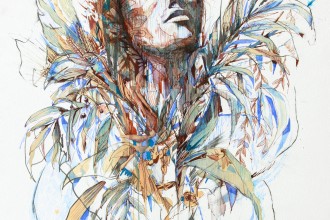
“Payam Feili is able to isolate and hand us a perfectly-contained vision that is coherent in its own strangeness ”
Reviewed by Jamie Osborn
—Payam Feili, ‘I Will Grow, I Will Bear Fruit’ (Gardoon Publishing, Germany, 2010)Â
What is most immediately striking about Payam Feili’s first novel is its sheer weirdness. A series of drug-induced reveries presents three men, apparently garrisoned in a coastal town on the Mediterranean either following or during an unspecified Middle Eastern war, smoking, hallucinating, carving a statue of the Queen of Israel. But this remarkable work, part confession, part visionary meditation, most of all a deeply personal account of love and sexuality under taboo, moves beyond baffling delusion to achieve an enticingly rich complexity of political, interpersonal and emotional tension.
The narrator (significantly, we are never given his name) declares immediately that
“I am twenty-one. I am a homosexual. I like the afternoon sun.â€
He is passionately in love with the man he calls Poker:
“He is twenty-one. He likes the afternoon sun, and he is not a homosexual.â€
“With a small piece of insanity in our pockets, we searched for Benyamin’s life among the dead. But it was as if he was so dead that he could not even be found among the corpses.â€
Payam Feili is also a poet, and his fiction approaches poetry in both its lyric beauty and its skilful control. The mix of registers is strangely compelling: “Hey! … You glorious mother of Israel from whose mouth divine rivers flow and on whose brow the bright lights of the Mesopotamia glow. I am here, my body is burning. Do you not have any Mediterranean healing plants?†Moments of clarity and ordinariness emerge from the mysticism of the hallucinations, and surprise us with their directness of movement: “I get up. In a single gulp, I drink the wine Akhenaten has brought, and I wonder how many stars shine in unison in the sky over Israel.†The prose is structured in a sophisticated framework of repetitions. It builds and moves towards a startlingly open ending with artistic control reminiscent of music. There is drama that would be worthy of a full orchestra or an opera, and then the penetrating pathos expressed by a single lonely voice crying out in the desert.
This is a novel that dwells in and grasps at the ephemeral, and, remarkably, it manages to achieve that impossible feat of recreating a dream so that it retains all its integrity, without taking on the foreignness with which our dreams inevitably become tainted when we view them from a distance. Just as the mother in the story “produces a troubled dream from among her dreams and holds it out to meâ€, so Payam Feili is able to isolate and hand us a perfectly-contained vision that is coherent in its own strangeness. The characters, too, are imagined as possessing a deep level of consciousness that makes them very much alive and correspondingly unknowable. We are constantly being taken in unexpected directions in our understanding of both the novel and its characters, and perhaps this is convincing precisely because human emotional reality is so surprising, so perverse. Ultimately we are left with a sense of something grasped that nevertheless fragments and remains elusive, like “An altered image of a name vanishing in the fog, syllable by syllable.â€




